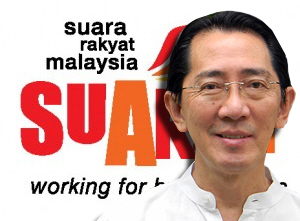Abolishing the Death Penalty & Keeping Alive the Hope of Justice for Altantuya

If the death penalty is carried out, we will never know the full story of why they murdered the woman; whether she was connected with the purchase of the RM7 billion Scorpene submarines or if they were induced by people in power to murder her.
Kua Kia Soong, SUARAM Adviser
There is no better time for our country to abolish the death penalty than the present predicament we face in trying to extradite one of the convicted murderers of Altantuya from Australia. Since the Australian government cannot bring itself to return someone to Malaysia where he will be facing the death penalty, why don’t we do the just and reasonable thing by doing away with the death penalty once and for all? In so doing, we can ensure that this other convicted killer of Altantuya faces justice in our country.
The Most Diabolical of Murders
The 1948 Universal Declaration of Human Rights prohibits all forms of “cruel, inhuman or degrading treatment or punishment.” Capital punishment for murder offences has been abolished in Britain since 1965. Although the issue has been brought up periodically in the House of Commons, it has always been defeated. Today, most of Europe has abolished the death penalty. By the 1970s, capital punishment had been abolished as a statutory punishment in about one quarter of the world’s nations including Australia.
The judicial taking of life has been described as “the most pre-meditated and most diabolical of murders.” It is basically a relic of the primitive drive for revenge and it merely passes the responsibility to the judge or jury who are supposed to be acting on our behalf. It is indicative of the primordial psyche that we are not content that criminals be safely put away in prison, we demand their death!
Executions dehumanize society and undermine the common values upon which the full and free development of human society is based in all cultures. The value of human life is lessened once a state, in avowing the defence of its citizens, resorts to inhuman and degrading forms of punishment.
No Evidence that Capital Punishment Deters Crime
Perhaps the most popular misconception is that capital punishment acts as a deterrent to crime for there is little evidence to show this. According to the British Home Office Research Unit study undertaken in the eighties, over the previous decade the increase in murders in the various categories had been insignificant. This was despite the fact there was a war in Northern Ireland.
Another strong argument against capital punishment is that it entails irrevocable miscarriages of justice. In Britain, if the law on hanging had not changed in 1964, at least six men would have been hanged for offences they did not commit. The film “Hurricane” tells the story about the former US boxer Rubin Carter who spent more than twenty years in jail for a murder he did not commit. If he had been hanged soon after his conviction, his death would have been on the nation’s conscience forever!
This was accounted for by the fact that no legal system is infallible. Moreover, as in the case of Hurricane, miscarriages of justice usually take time to surface.
Inconsistencies in the Altantuya Case
In the case of the two convicted murderers of Altantuya, I don’t think full justice has been done to the Mongolian lass Altantuya since the motive for the murder was never established by the court.
If the death penalty is carried out, we will never know the full story of why they murdered the woman; whether she was connected with the purchase of the RM7 billion Scorpene submarines or if they were induced by people in power to murder her.
There have been too many inconsistencies in the Altantuya case, for example:
– The assertion that all records of Altantuya’s entry and presence in Malaysia were erased from the computers of the Immigration Department – the Immigration Department needs to clarify this fact;
– the sudden removal of the presiding judge before the trial started and the changing of the head of the prosecution team at the eleventh hour;
– the fact that the defence lawyers for the three accused kept changing with one walking out on the first day of hearing, charging that “third parties” were interfering in his work;
– when both defence lawyers and prosecutors cut off a witness (Altantuya’s cousin) from testifying further when she revealed that the victim had shown her a photograph of herself, Baginda, Najib and “others” having lunch in a Paris restaurant.
Possibility for Plea Bargaining?
Who knows? There may come a day when a retrial is ordered and the two convicted men can fully spill the beans over the whole beastly affair. There might even be the possibility of plea bargaining to induce the two convicted men to do this in exchange for a shorter sentence. This is only possible if the death penalty is abolished in this country.
Thus, at a stroke we will have become a more humanist society and we can keep alive the hope that justice will be done for Altantuya when the motive for her murder has been established.

